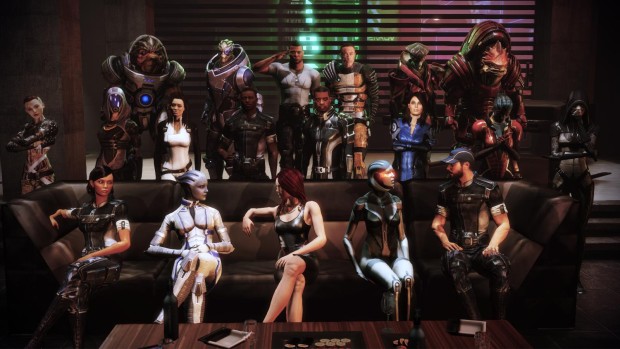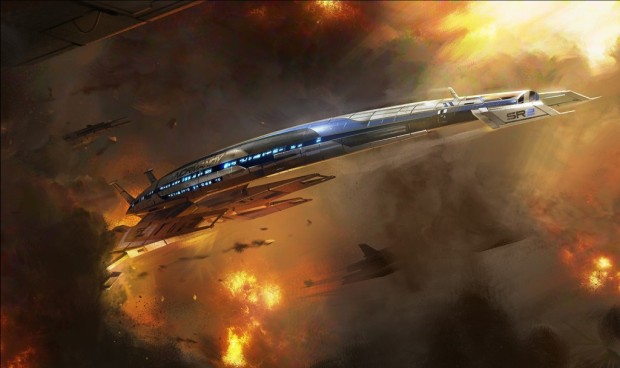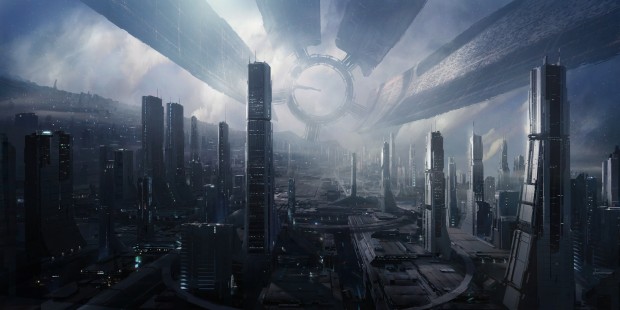
Looking back over the games I’ve played over the course of 2015 it’s striking just how many big games are present. And I mean big in the sense of time investment rather than production values or sales – although, let’s be honest, we’ve still not emerged from the era where the biggest games tend toward all three characteristics.
At the beginning of the year I played through Shadow of Mordor in what, looking back, is a surprisingly tidy 21 hours (hat-tip Steam statistics). It felt like ever so slightly longer, which I guess means the game was on the verge of outstaying its welcome. My girlfriend and I 100%’d Lego Jurassic World (which is a lot of fun if you like dinosaurs, no matter what AJ says) in 34 hours, and I invested an amount of time between those two figures in the older Prototype 2. I’ve started but not finished Alien Isolation, which I understand can clock in at around 40 hours.
It’s not just big-in-budget games, of course: defeating Black Isle-style CRPG Pillars of Eternity took 65 hours of my time, whilst delightful Syndicate tribute act Satellite Reign entertained me for 29 hours. Nor are long games new, as we all know. I should here acknowledge Vampire: The Masquerade – Bloodlines, which I finally played through (30 hours). It’s an interesting game, and I can see why it’s remembered so fondly and has proven somewhat influential, at least among games writers, but let’s be honest: it has rough edges you could impale yourself on.
But none of these have proven to be the biggest timesink. Can you guess what has?

It’s the Mass Effect trilogy! Bet you thought it was gonna be Fallout 4 (123 hours, for the record – guh).
As my diary series acknowledged, I probably spent a little over three months playing through the central Mass Effect trilogy, including every piece of DLC. Each was a big game to begin with, and playing through all the DLC and sidequests available adds a lot of padding. Did I say “padding”? I meant “memorable experiences”, of course.
I intended to write a lot of articles off the back of playing through this trilogy but never did. In retrospect I think I was playing through the trilogy again because I wanted to, and my talk of articles was always a justification of the time investment I was committing too.
So why did I want to play through the games again? Why do I find them so pleasant an experience? Well, first let’s acknowledge some of the core issues of these games first.They’ve generally been positioned as RPGs, but in truth they’re RPGs with pretty much every other system outside combat and dialogue lifted out. If you’re to play a Mass Effect, you had better enjoy both shooting things and talking to things. If you don’t there’s an inherent issue.
This is exacerbated because neither system is particularly deep. The combat is entertaining but, on normal or often on hard, not a great challenge once you’ve got a few tricks up your sleeve – the first game, I think, is the most difficult, perhaps because it features far and away the least polished design and implementation. The dialogue system is largely consistent throughout the trilogy, and is generally beholden to the Paragon/Renegade binary morality system, which is the source of many of its problems. Decisions, let alone human morality, are rarely binary. The crudity of such systems becomes apparent as soon as the player wishes for nuance.
There is also much clashing between the parts of Mass Effect that are eager to function as hard SF (as hard as space opera gets, at any rate) and those that want to provide cinematic entertainment. This can be illustrated by many examples, not least the Codex’s descriptions of fleet combat occurring at distances of hundreds or thousands of kilometres, versus the cutscenes that show spacecraft whizzing right next to each other like a goofy Star Wars space dogfight.

Fortunately for me I can look past internal contradictions, because I like both shooting and talking, and I find the pacing of the Mass Effect games acceptable enough that its shifts between one and the other come as welcome flushes of my gaming palette. Further, I am a big old science fiction nerd, and these games have clearly been crafted by many people with similar interests. Among the themes of the games are evolutionary uplift and unintended consequences, artificial intelligence and the nature of sentient/sapient life, co-operation and empathy versus bigotry and empathy (oops, I got all binary there, sorry guv’nor), and the cyclic nature of history. All of this is explored on a vast canvas, one that successfully simulates a galactic scale and that stretches back first through hundreds of thousands of years of history, and later millions.
Whilst these themes are rarely tied in mechanically with the game, outside of the dialogue decisions you can make within the confines of the game’s largely linear plot, they provide a wonderful backdrop. You will also spend a lot of time pondering these ever-present ideas thanks to the games’ length. The trilogy’s large but often recurring cast also means you will grow to care for, dislike or at least be interested in its characters as they grow and change alongside you. And melodramatic it may often be, but I can’t deny a genuine emotional response to many moments throughout Mass Effect. Its story has its hooks in me, and whenever I hear its soundtrack I’m immediately transported back. I’m talking about nostalgia – an emotion too easily manipulated for crass commercialism in today’s times, but a powerful and pleasant one nonetheless.
My gosh are there many more aspects of these games I could criticise: the weaker characters, the tonal dissonance between instalments, the weird repositioning of gross genocidaires-in-waiting Cerberus for the second game, the appalling sticky cover system of the first game and the transparent environmental design of the second, the over-reaction in removing equipment systems from the second game after its predecessors inventory excess, DLC that hit with all the force of a ‘spicy’ Pot Noodle. The fucking planet scanning! GOD. Not to mention that furor with the ending to the third game, where a combination of players unable to read between lines and Bioware forgetting that players might care about their characters resulted in a retrofitted new conclusion that, er, spoiled the pacing of one of the trilogy’s most intense scenes as a byproduct.
But there are also so many more things, small and large, that I love: the unexpectedly brilliant multiplayer in the final instalment, the way the systems of the first two games were pulled together to form the clever balance of the third, driving the Mako up sheer cliffs because it fucking can, the Citadel DLC with its fantastic fan service, great writing, loving farewells, and genuine wit; the sense of exploration and mystery that so successfully permeates all three games, the advances in game technology and execution of cinematic technique as the trilogy progresses, the visual design of characters, environments and technology, the suicide mission, the building of forces and readiness as both mechanic and progress chart in the third game, and the spine-tingling moments when your preparations play out at an instalment’s climax.
I love these games, warts and all, though I fear what their commercial success means for the future of the series. Thankfully, Bioware have at least had the courage of conviction to eject everything but the name itself for forthcoming instalments – a sign, to me, that they could still do interesting things with their space operatic setting.


Comments
14 responses to “Shaun’s Best of 2015 – Timesink Award”
I had a sneeking suspicion that this game was going to be in here.
To be honest, there are some moments in Mass Effect but I think your love of the series has more to do with your love of the Chronicles of Riddick film and that Pacific Rim atrocity than them actually being good games.
I don’t love the Chronicles of Riddick film – I think it’s not very good, but (at the time) was pretty unique because no one was making weird baroque space operas any more. This is, er, a bit less the case today. I do like Pacific Rim quite a lot, though I think its similarities with Mass Effect more or less end at “has mechs”. :)
You forgot to add:
‘… and are massively overrated by people who like stories with people that inverted commas in their names’
You forgot to add:
‘… and are massively overrated by people who like stories with people that have inverted commas in their names’
I see where your jibe is coming from, although Mass Effect isn’t a bad offender in this regard.
Why, they’re even internally consistent with it: the Quarians use apostrophes in their names to denote family-and-ship as key parts of their social identity, which is an SFnal conceit I like.
The blue ones also use apostrophes, and I’m not entirely clear on why, but again it’s used consistently so I assume it’s a contraction of sorts (as in something like D’Artagnan).
Ultimately the problem with bad SF and fantasy names derives from throwing around exotic-sounding things willy nilly; if you’ve invested some thought into something and are consistent with it, that’s fine.
This is somewhat interesting and relevant: http://www.tor.com/2013/08/27/apostrophes-in-science-fiction-and-fantasy-names/
NEXT :)
After finishing Dragon Age: Inquisition at the very end of 2014 with 89 hours on the clock, I told myself I will focus on playing, and finishing, more games of much smaller scope. I ended up playing almost only the big, fat, long, open games throughout the whole 2015. Maybe I just like them that way, and there’s no going around it?
I did manage to play through several quick ones, like the brilliant Outlast, my early year favourite Ori and the Blind Forest, the surprisingly short Halo 5, or the godawful puzzler Pneuma: Breath of Life. But for each of these there was a counterweight, starting with a moderate 27 hours per game for Dead Rising 3 and Splatoon, and going from there through whatever it took me to beat Bloodborne (where’s the time counter, PS4?), up to 104 hours spent on Dark Souls 2 remaster/remake, and the obvious timesink winner for me, The Witcher 3: Wild Hunt eating 124 hours of my life. So that beats your Mass Effect, do I win something?
That’s a whole lot of time and I still missed many of 2015 big releases like MGSV, AC: Syndicate or Fallout 4. I skipped on the latter two deliberately, to play them in 2016 (if ever in F4’s case), but kind of wish I had more time to get into MGSV or Just Cause 3.
Anyway, congratulations on beating Vampire: Bloodlines, a game I played through multiple times, but probably wouldn’t do it again after all the years. I strongly encourage you to play through Alien: Isolation. I played it rather thoroughly, and it’s “only†a 25-hour game for me, which I still plan to replay all over again on higher difficulty. It was a game I really wanted to not suck and expected myself to sugarcoat it just because of my love for the original film, and I didn’t have to. Meeting and exceeding expectations through the AI that works as advertised (and they advertised it to death in every preview/interview/presentation), incredible sound design and a lot of care put to every aspect of the game which somehow was not destroyed by SEGA execs.
As for the Mass Effect, I just love the trilogy, with all its flaws, of which there are many. And you can’t argue with love. I have not tried playing them again, though. I think that’s because I have my Mass Effect trilogy experience coded in brain, which I believe was unique and nobody else had it that way. I’m afraid that revisiting these characters will make me look at them as programmed moving pixels, much the same reason why most people don’t want to replay things like Walking Dead or Heavy Rain. I don’t quite remember if ME actually has a good gameplay, but it managed to keep me invested throughout the years due to the story, the world, the lore. To some extent it proves that immersive story and believable characters are what gamers care about, sometimes over the gameplay. It happened to me also with Bioshock, which I thought was an ok, slightly above mediocre shooter, but with an outstanding game storytelling and revelatory meta-meaning. On the other hand, developers tend to put shit whatever story to their games to grab the gamers attention, because Mass Effect and some others were such a big success. I think, the difference is that Bioware just understood that making a story-driven game is not about giving player barebones reason to shoot stuff, but writing a story that player will want to hear more than he/she will want to shoot stuff. I don’t know if this is the best way to make video games in general, but as diverse as this medium is in trying to provide various types of experiences, it is one of the ways and with Mass Effect they executed it with great proficiency.
Oops – it appears that I’m an idiot and neglected to include a figure for my complete ME trilogy playthrough. It’s a ballpark figure as I haven’t loaded up my saves to confirm, but it’s in the region of 80hrs per game, for about 240hrs total. So I’m afraid there is no prize for you. ;)
On ME’s gameplay: I think I would say that the simplest description is that it’s usually engaging enough to keep you ticking over. In truth, I think ME2 has the blandest, flattest gameplay in most regards, and is the most dull to play through. ME1 had a lot more in there, but it was very rough, very unbalanced, and its engine a little buggy to boot. I find ME3’s combat toolbox to be the most balanced and fun, with the most varied range of opponents and strategies. Others probably disagree with me; different character builds function very differently when you set the difficulty to be challenging, and so experiences in each game will differ a lot.
I agree that what ME did was tell a story that people wanted to come back to; on top of this, they situated that story within a setting that people cared about. Most games completely fail to grasp the importance of avoiding internal contradictions with their characters and lore. ME is plenty guilty of the latter, and sometimes the former, but the structure of its setting and the relationships between its characters and the player is bolstered by there simply being so much there. Hell, it has a built-in Wikipedia to encompass its setting’s breadth.
I will play Alien: Isolation through eventually… honest injun. Still dabbling in Demons Souls at the moment though. With occasional sojourns into smaller PC delicacies…
I actually really enjoyed Pneuma. Very simple game with very little in it but the puzzles were fun and the narrator kept me entertained.
I nearly made a snarky comment to the effect that I loved Mass Effect and would have loved to see a couple of sequels for it, but thought better of it. I’ve resolved to be a better man this year, you see.
See, if ME2’s gameplay hadn’t been quite so stripped back, or maybe ME2 just had the gameplay of ME3, and the whole Cerberus plot for the middle act hadn’t happened, and a few other contradictions and retcons hadn’t been made… I think we’d have had a much better series.
To be honest, I’m impressed it’s as coherent and consistent as it is, given that it’s a multi-billion franchise produced over an eight year period by hundreds of different people – for a medium that is still quite overtly disinterested in the technical aspects of writing that produce coherence and consistency.
Still don’t blame you for being burned by ME2, though.
The best thing I can say for ME2 is that it made me appreciate ME and what it tried to do more. I originally classed ME as “almost good”, but retroactively upgraded it to “great but flawed”. There’s just so much ambition in ME, while ME2 plays it safe. I feel ME could have been the starting point of something sweet, but the ham-handed way ME2 addressed the weaknesses threw the baby out with the bathwater.
The other big problem with ME2 is that it is entirely pointless. ME3 finally gets to the stuff ME2 should have been about, learning more about the Reapers and gathering resources against the threat (way too late), while ME2 wasted everybody’s time with the b-squad’s racist-sponsored really bad-ass space cruise. It’s rare that a sequel lowers the stakes and the scale like that. It honestly looks like an unrelated game idea was re-purposed as a ME sequel, with ME universe hammered in shape to accommodate it.
ME3 was in many ways a huge improvement on ME2, but it also doubled down on some stupidity.
ME3 “doubling down on stupidity”: are you talking writing & cinematics, or are you talking game mechanics?
The former.
Ah, well, in that case I can speculate as to what you mean. I probably agree.